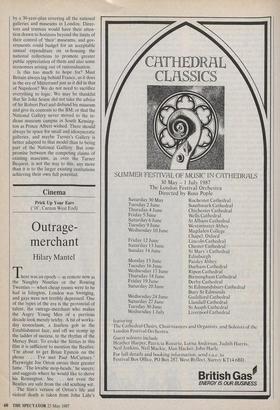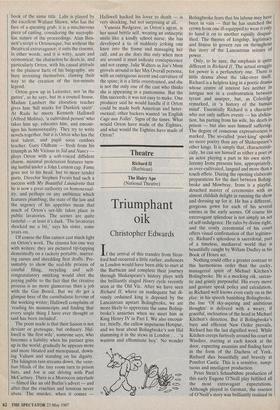Cinema
Prick Up Your Ears ('18', Curzon West End)
Outrage-
Hilary Mantel
here was an epoch — as remote now as the Naughty Nineties or the Roaring Twenties — when cheap rooms were to be had in Islington, London was Swinging, and gays were not terribly depressed. One of the types of the era is the provincial of talent, the outrage-merchant who makes the Angry Young Men of a previous decade look merely tetchy. A bit of worka- day iconoclasm, a fearless gob in the Establishment face, and off we stomp up the ladder of success, to the rhythm of the Mersey Beat. To evoke the Sixties in this film it is sufficient to mention the Beatles: 'I'm about to get Brian Epstein on the phone . . . I've met Paul McCartney.' Playwright Joe Orton envies their greater fame. 'The lovable mop-heads,' he sneers; and suggests where he would like to shove his Remington. See . . . not even the Beatles are safe from the old scathing wit.
The film's version of Orton's life and violent death is taken from John Lahr's book of the same title. Lahr is played by the excellent Wallace Shawn, who has the face of a questing grub; it is a mischievous piece of casting, considering the necrophi- liac nature of the proceedings. Alan Ben- nett's script is Ortonesque, but without the theatrical extravagance; it suits the cinema, in other words, and it is witty, acute and economical; the characters he deals in, and particularly Orton, with his casual attitude to the plainest facts of his biography, are busy inventing themselves, clawing their way to the creation of the ten-minute legend.
Orton grew up in Leicester, not 'in the gutter', as he says, but in a council house. Madam Lambert the elocution teacher gives him 'full marks for Dunkirk spirit'. At Rada he meets Kenneth Halliwell (Alfred Molina), 'a cultivated person' who takes him up, educates him, and encour- ages his homosexuality. They try to write novels together, but it is Orton who has the real talent, and pupil soon outdoes teacher. Gary Oldham — fresh from his triumph as Mr Vicious in Sid and Nancy plays Orton with a soft-voiced diffident charm, minimal proletarian features turn- ing lustful under a John Lennon cap. Fame goes not to his head, but to more tender parts. Director Stephen Frears had such a success with My Beautiful Laundrette that he is now a great authority on homosexual- ity, and perhaps on any ambience which features plumbing; the state of the law and the urgency of his appetites mean that much of Orton's sex-life takes place in public lavatories. The scenes are quite tasteful — at least it's dark. 'The lavatories shocked me a bit,' says his sister, some years on.
Of course the film cannot cast much light on Orton's work. The cinema has one way with writers: they are pictured tip-tapping dementedly on a rackety portable, mutter- ing curses and shredding first drafts. Pre- sumably to show the real-life process of careful filing, recycling and self- congratulatory smirking would alert the paying public to the fact that the creative process is no more glamorous than a job with the Gas Board. But we do get a glimpse here of the cannibalistic fervour of the working writer; Halliwell complains of `reading his manuscripts and finding that every single thing I have ever thought or said has been included'.
The point made is that their liaison is not deviant or grotesque, but ordinary. Hal- liwell is 'the first wife', someone says, who becomes a liability when his partner goes up in the world; gradually he appears more and more bloated and menopausal, down- ing Valium and standing on his dignity. The Islington rain streams down, the vene- tian blinds of the tiny room turn to prison bars, and Joe is out driving with Paul McCartney. There is a Moroccon interlude — filmed like an old Butlin's advert — and after that the cruelties and tensions never abate. The murder, when it comes — Halliwell hacked his lover to death — is very shocking, but not surprising at all.
Vanessa Redgrave, as Orton's agent, is her usual brittle self, wearing an antiseptic smile like a kindly school nurse; she has developed a tic of suddenly jerking one knee into the frame and massaging her calf, and as she does this only when men are around it must indicate concupiscence and not cramp. Julie Walters as Joe's Mum grovels around in her Mrs Overall persona, with an outrageous accent and curvature of the spine; it is a little overstrained, and she is not the only one of the cast who thinks she is appearing in a pantomime. But the film succeeds; it was not easy to make. One producer said he would handle if it Orton could be made both American and heter- osexual; other backers wanted 'an English Cage mu Folks'. Signs of the times. What would Orton have made of the Eighties, and what would the Eighties have made of Orton?










































































 Previous page
Previous page